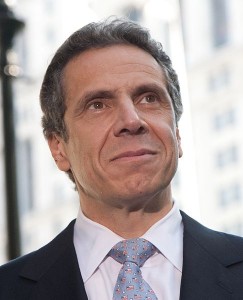Controversial hydrofracking practice may return to Empire State


New York governor Andrew Cuomo's administration is proposing to lift a moratorium on a controversial natural gas drilling practice called "hydrofracking" across the state - except in areas that are vital watersheds for public drinking water.
The technique is employed to extract natural gas from shale, and New York is prime territory. The state is home to a potentially massive repository called the Marcellus Shale. The formation spans across most of the Empire State.
Here's how hydrofracking works: a borehole is dug deep into the ground to inject a proprietary chemical mix that breaks up and opens channels in rock formations; gas is then expelled from the rock and collected.
Gas drilling companies want access to New York's abundant natural gas resources, and hydrofracking makes the gas easily accessible. Advocates believe natural gas is a cleaner transition fuel to coal and oil that will create jobs within the state.
However, pressure from the public and environmental interest groups (I've been receiving petitions in my inbox all week long) has halted their efforts - with good reason.
It may sound straightforward, but there is risk for serious groundwater contamination. Gas companies have used toxic chemicals, including diesel fuel, and scientists have uncovered flammable drinking water around nature gas extraction sites.
That may be why Cuomo's proposal prohibits drilling in New York City's watershed and around Syracuse. The inclusion of those restrictions indicates that the governor is not entirely confident that hydrofracking is safe. I also wonder why he waited to announce his plans until just before a major holiday.
That's a good way to bury bad news. I just hope that the state isn't burying what's in the public's best interest.
This post was originally published on Smartplanet.com